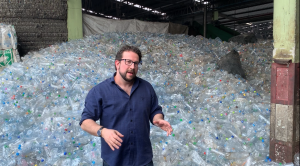How businesses can help save our oceans from the plastic crisis
To celebrate World Ocean Day, we are focusing on what businesses can do to protect marine ecosystems and sustain the blue economy.
Human activity is destroying marine ecosystems at an unprecedented scale. As per WEF research, humans have altered over 60% of marine environments. On the other side, the blue economy is valued at €1.3 trillion and contributes to about 31 million direct full-time jobs. So, what more can business and sports organisations do to protect marine ecosystems and sustain the blue economy?
In this article, Raffi Schieir, Co-Founder & Director of Bantam Materials supplying Prevented Ocean Plastic, sets out the business case for stopping plastics entering our ocean.
Meaningful Business (MB:) Why should businesses care about protecting the oceans and marine ecosystems?
Raffi Schieir (RS): The climate and ocean crises are global problems with unprecedented consequences for our planet.
Projections suggest that by 2050 our oceans will contain more plastic by weight than fish. This shocking statistic makes tackling ocean plastic pollution more urgent than ever. The truth of the matter is once plastic goes into the water, it’s a clean-up effort not a recycling effort. Plastic material in the ocean is very hard to recycle because the salt and the sun degrades it. So, we need to catch it before it gets there and get it to a level of purity so it can be properly processed by the industry in a real and substantial way.
Responsible businesses should be considering their impact on the oceans and marine ecosystems, not just because it’s the right thing to do, but also because it makes good business sense. A 2021 survey shows that 92% of adults are concerned about plastic pollution, and almost 80% are taking steps to reduce plastic pollution. Supporting recycling and protecting our oceans adds value to businesses by addressing consumer needs and aligning with their values.

Raffi Schieir, Co-founder and Director of Bantam Materials, supplier of Prevented Ocean Plastic
MB: What is preventing businesses from doing more right now?
(RS): Right now, we aren’t doing enough to prevent our oceans from plastic pollution. And that’s partly because the recycling infrastructures we need to drive change still aren’t up to scratch.
Shockingly, only 9% of plastic ever produced has been recycled, and many of the countries most at risk of ocean plastic pollution lack the processing infrastructure.
This is why we need to build stronger recycling infrastructures and strengthen consumer demand for recycled products. These infrastructures will not only help to clean up our environment, but provide employment opportunities and access to a safe, reliable income to those living in countries at risk of ocean pollution.
At the same time, current policies do not go far enough to encourage business action. Ongoing delays and U-turns mean that organisations are hesitant to make the significant changes needed as they are unclear on the future regulations they are designing their products and business models for.
Similarly, the Plastic Packaging Tax, introduced in April of this year, applies to plastic packaging produced in, or imported into, the UK that does not contain at least 30% recycled plastic. Businesses could decide it’s easier to pay the tax and not take the action needed to promote sustainable practices. In my view, the inclusion of the 30% requirement itself is low, and there are currently no plans for it to increase in following years. Businesses who want to stand out need to be driving the 30% figure even higher and not waiting for policy to make the vital changes needed.

Raffi at a bottle recycling site
MB: What are some of the funding gaps that you think exist in this space?
(RS): There is talk that at least €160bn will need to be invested in making Europe’s plastics systems more circular and carbon-neutral by 2050, if long-term environmental commitments are to be met – but this is a distraction from what we can achieve today.
Instead of enormous investments, what we need is demand from consumers, action by business and public support from thought leaders. The Prevented Ocean Plastic programme demonstrates that, with $100k investment today, we can see significant environmental and social benefits. We don’t necessarily need enormous investments: relatively small-scale investment in recycling infrastructure, demand from consumers, action by business and public support from leaders can drive essential change. For example, one of our Prevented Ocean Plastic collection facilities is what an investment of around $100,000 provides a recycling method to locations without any and helps jump start the local economy.
This model can expand and be repeated on all coastlines at risk of plastic pollution. Often, we delay and distract by thinking about the huge investment needed 10 years from now – when, really, sparking entrepreneurial spirit in coastal communities can scale impact and more plastic can be stopped from entering the ocean.
MB: What are the biggest opportunities for businesses to invest in blue economy innovation?
(RS): For businesses looking to take action, perhaps the simplest way to support the blue economy is by reducing their dependence on new plastic and choosing recycled plastic in their products. For example, choosing to package products in Prevented Ocean Plastic means:
— Helping to stop damage to our oceans and save marine life.
— Cutting carbon emissions and helping to tackle climate change. New plastic made from oil and petrochemicals generates five times the amount of CO2 emissions in its production and transport than recycled plastic.
— Accelerating the end of new plastic production.
— Creating income and employment for people living in developing countries.
— Helping to drive up standards for the ocean-bound plastic recycling industry.
Choosing to recycled doesn’t have to come with a huge price tag. Recycled plastic costs only a fraction of a penny more per bottle than virgin plastics. Responsible businesses can opt to go beyond baseline legislative requirements and end their reliance on virgin plastics to support our oceans.
MB: Are there any examples you have seen of successful business collaborations with a focus on marine protection?
(RS): At Prevented Ocean Plastic, we’re proud of the real-world impact we make collaborating with international packaging manufacturers, brands and supermarkets. In 2020, Lidl became our first UK supermarket partner and in January 2021 Lidl picked up Retail Industry Awards ‘Sustainable Initiative of the Year 2020’ for the inclusion of Prevented Ocean Plastic packaging in their fish and poultry ranges. The collaboration will initially stop more than 60 tonnes of plastic from entering the ocean – the equivalent of 2.5 million plastic bottles.








